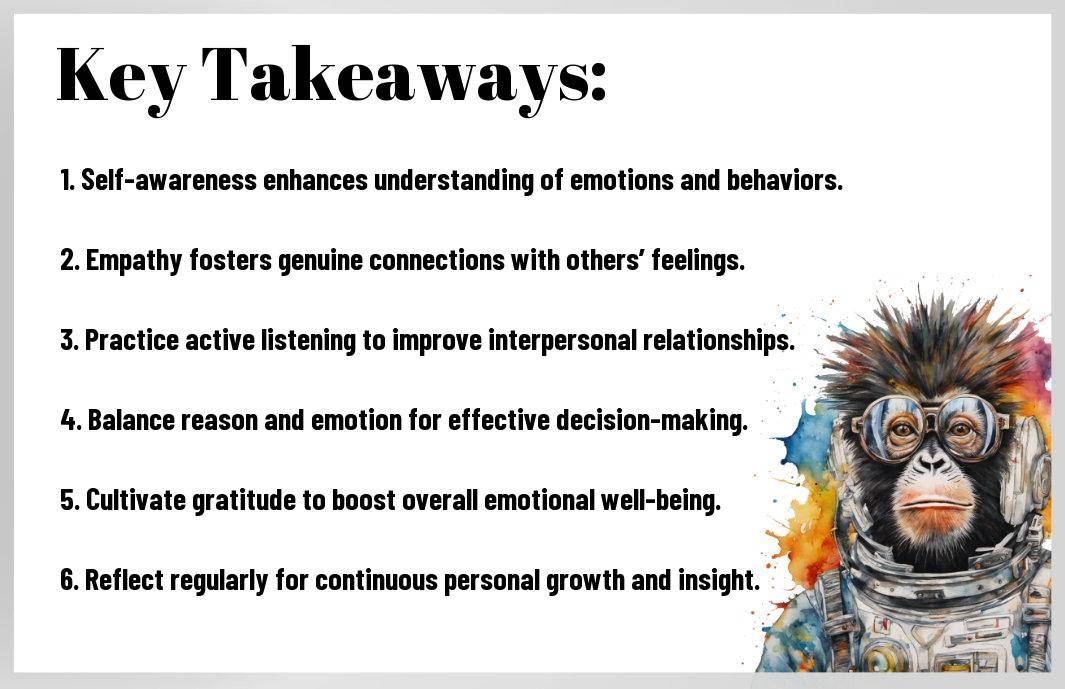You might be surprised to learn that the teachings of Aristotle can significantly enhance your emotional intelligence. I’ve discovered that by applying his timeless insights, you can better understand your own emotions and those of others. In this post, I will share practical ways to harness Aristotle’s wisdom, helping you navigate your feelings and relationships more effectively. Together, we’ll explore how his philosophy can lead to a deeper connection with yourself and the people around you. Let’s dive in and unlock the potential of emotional intelligence together!
Key Takeaways:
- Self-Awareness: Understanding your own emotions enhances your ability to manage them effectively.
- Empathy: Aristotle emphasized the importance of connecting with others, enabling deeper relationships based on understanding.
- Rhetoric: Mastering the art of persuasion can boost your communication skills and influence in social settings.
- Virtue: Cultivating virtues such as courage and moderation strengthens emotional resilience and decision-making.
- Adaptability: Learning to adjust your emotional responses in different situations leads to better interpersonal interactions.
- Reflection: Engaging in introspection promotes personal growth and a deeper understanding of one’s emotional landscape.
- Community: Aristotle believed that fostering relationships within a community enhances emotional support and personal well-being.

Understanding Emotional Intelligence
To truly grasp the concept of emotional intelligence, it’s crucial to investigate into its core components. Emotional intelligence, often abbreviated as EQ, refers to the ability to identify, understand, and manage our own emotions while also being attuned to the emotions of others. This means being able to recognize feelings such as joy, sadness, anger, and anxiety—both in myself and in those around me. By cultivating this awareness, I can navigate social interactions more effectively, communicate better, and improve my relationships, both personally and professionally.
What is Emotional Intelligence?
By defining emotional intelligence, you can see that it encompasses several critical skills. These skills include emotional awareness, emotional regulation, empathy, and social skills. When I practice these skills, I can better manage stress, communicate more effectively, and even resolve conflicts with greater ease. It’s a blend of self-awareness and social awareness that can enhance your understanding of not just yourself, but also the people you interact with daily.
The Importance of Emotional Intelligence in Daily Life
Across various aspects of life, emotional intelligence plays a significant role in how we connect with others and handle challenges. I’ve often found that understanding my emotions helps me to react thoughtfully rather than impulsively, promoting healthier relationships and reducing misunderstandings. This understanding fosters a nurturing environment where everyone feels valued and can communicate more openly.
Emotional intelligence is integral to success in both personal and professional realms. When I practice emotional intelligence, I contribute to a positive atmosphere, which makes it easier for collaboration and teamwork to flourish. Not only does this skill help in improving how I relate to others, but it also enhances my ability to lead, adapt to change, and manage stress effectively. By prioritizing my emotional intelligence, I empower myself to handle life’s ups and downs with greater resilience and grace.
Aristotle’s Views on Emotions
Assuming you’re curious about how emotions shape our lives, Aristotle offers insightful perspectives that can enhance your emotional intelligence. In his exploration of human behavior, he emphasizes that emotions are not simply fleeting feelings to be ignored; rather, they play a significant role in guiding our actions and decisions. By acknowledging and understanding our emotions, we can gain valuable insights into our motivations and the motivations of those around us, enabling us to respond more thoughtfully and effectively in various situations.
The Role of Emotions in Human Behavior
To explore deeper, Aristotle suggests that while emotions can sometimes be overwhelming, they also serve a purpose in human behavior. When we feel joy, anger, or sadness, these emotional responses often reflect our values and beliefs. They signal what’s important to us, guiding our choices in relationships and daily interactions. As you become more attuned to your emotions, you may discover that understanding their triggers can empower you to manage your reactions, fostering a more balanced and intentional way of living.
The Concept of Virtue and Balance
At the heart of Aristotle’s philosophy is the idea of virtue, which represents the ideal balance between extremes of excess and deficiency in our emotional responses. He posits that achieving this balance is imperative for personal development and well-being. This means that, instead of allowing emotions to dominate our lives, we should cultivate virtues that encourage moderation. By doing so, I believe you can enhance your emotional resilience and cultivate healthier relationships with yourself and others.
For instance, consider the virtue of courage. It isn’t simply about being fearless; instead, it involves recognizing fear and responding appropriately. When faced with challenging situations, you might experience anxiety, but instead of allowing that anxiety to paralyze you, courage encourages you to acknowledge and manage those feelings. This balanced approach helps you act in line with your values, fostering emotional intelligence and improving your relationships, both personally and professionally.

Applying Aristotle’s Wisdom
After exploring the essence of Aristotle’s teachings, I find it incredibly rewarding to think about how I can apply his wisdom in my daily life. Emotional intelligence is not just an abstract concept; it’s something we can actively cultivate. One of the first steps I can take in enhancing my emotional intelligence is through self-awareness. This is where understanding my emotions and their origins becomes vital, allowing me to navigate my feelings and reactions more effectively.
Cultivating Self-Awareness
Behind every emotional response lies a deeper understanding of myself. I’ve learned that by reflecting on my thoughts and feelings, I can uncover patterns that influence my behavior and interactions with others. Journaling or engaging in mindfulness practices can be beneficial ways to facilitate this exploration. By embracing Aristotle’s idea of knowing myself, I create a foundation for emotional growth that informs not only how I perceive the world but also how I connect with those around me.
Developing Empathy
Among the many insights I gleaned from Aristotle’s teachings, the importance of empathy stands out as a key element of emotional intelligence. Cultivating empathy allows me to place myself in the shoes of others, enhancing my ability to understand their feelings and perspectives. This wider view not only enriches my relationships, but it also fosters an environment of trust and mutual respect, where open communication can thrive.
This process of developing empathy involves actively listening to others and seeking to understand their emotions without judgment. By tuning into the non-verbal cues, facial expressions, and even the context of their experiences, I can deepen my connections with the people in my life. When I make a conscious effort to look beyond my own experiences and perspectives, I find that I’m not just a participant in conversations but a true ally to those I care about. This shift in mindset is empowering and continuously enhances my emotional intelligence in meaningful ways.

Building Stronger Relationships
Now that we’ve uncovered the foundations of emotional intelligence, let’s explore how we can build stronger relationships using Aristotle’s timeless wisdom. Aristotle believed that our ability to relate to others is enhanced through understanding our own emotions and the emotions of those around us. By developing our emotional intelligence, I’ve found that I can navigate interpersonal dynamics more effectively, ultimately leading to deeper, more meaningful connections with others.
Communication Skills Enhanced by Emotional Intelligence
Against a backdrop of history, Aristotle once expressed that effective communication is key to human interaction. When I focus on my emotional intelligence, I can tune into the feelings behind the words spoken. This helps me respond more empathetically, ensuring the other person feels valued in our conversation. I’ve noticed that when I articulate my feelings clearly, I invite others to do the same, creating a safe space for honest dialogue and mutual respect.
Conflict Resolution the Aristotelian Way
On the subject of conflicts, Aristotle taught that understanding varied perspectives is vital for resolution. When I face a disagreement, I remember to put myself in the other person’s shoes, assessing what they might be feeling and why they may be reacting the way they are. This approach helps me to stay calm and focused, rather than succumbing to the heat of the moment. Rather than viewing conflict as a negative experience, I see it as an opportunity for growth and connection, ultimately helping to strengthen my relationships.
At the heart of conflict resolution, I’ve learned the art of active listening, which Aristotle emphasized. By truly listening to the concerns of others, I can identify underlying issues that may not be immediately apparent. This practice not only allows me to address the problem effectively but also demonstrates my commitment to the relationship. Conflicts become less about winning an argument and more about finding common ground, leading to resolutions that honor both parties’ feelings and perspectives.
Practical Tips for Boosting Your Emotional Intelligence
Despite the challenges we face in our daily interactions, enhancing emotional intelligence is a rewarding journey that can lead to deeper connections and a more fulfilling life. To help you start this journey, here are some practical tips I find helpful:
- Practice active listening by giving full attention to the speaker.
- Keep a journal to reflect on your emotional responses and triggers.
- Engage in regular mindfulness exercises or meditation.
- Seek feedback from trusted friends or colleagues about your emotional interactions.
Recognizing the importance of these practices can be the first step towards a more emotionally intelligent life.
Daily Practices for Greater Awareness
Emotional intelligence grows significantly when I prioritize daily practices that foster self-awareness. I often start my morning by setting intentions and reflecting on any emotions, good or bad, that I anticipate facing during the day. This kind of introspection can provide clarity and help me process feelings as they come up. In my experience, I also find that taking a few minutes each day to practice deep breathing or mindfulness can create a more centered and focused approach to whatever life brings my way.
Additionally, I encourage you to establish a routine that allows you to pause and check in with your emotions throughout the day. Whether it’s during a lunch break or while taking a walk, taking these brief moments to acknowledge how you feel can significantly increase your emotional awareness. This practice of self-checking has transformed the way I interact with others, allowing me to respond more thoughtfully.
Exercises Inspired by Aristotle
Inspired by Aristotle’s wisdom, I have found that engaging in exercises centered around self-reflection and empathy can dramatically improve emotional intelligence. One of my favorite methods involves recounting events from my day and evaluating my emotional reactions to various situations. Aristotle emphasized the importance of virtue and balance, guiding me to find where I might overreact or underreact. By assessing my responses, I gain valuable insights into my emotional landscape and can work towards more balanced reactions.
Consequently, I often practice placing myself in others’ shoes, reflecting on their feelings and perspectives in each interaction. Through these exercises, I learn to bridge the gap between my experiences and those of others, allowing me to respond more compassionately and with greater understanding. By integrating Aristotle’s principles into these practices, I nurture my emotional intelligence while appreciating the complexity of human emotions.
Final Words
Considering all points, enhancing your emotional intelligence through Aristotle’s wisdom can be a transformative journey. I truly believe that by embracing self-awareness and practicing empathy, you not only improve your relationships but also cultivate a deeper understanding of yourself and others. It’s all about taking thoughtful steps in your daily life, learning how to manage your emotions, and recognizing the value they bring to your experiences. By adhering to Aristotle’s principles, I find that I can navigate life’s challenges with a clearer mind and a more compassionate heart.
If you’re interested in diving deeper into this journey, I encourage you to explore resources like Building Your Emotional Intelligence Through Self-Reflection. It can provide insightful strategies and reflections that align with this timeless wisdom. I hope you begin on this path of self-discovery and growth, as the rewards are truly enriching for both yourself and the people around you.
FAQ
Q: What is emotional intelligence (EI)?
A: Emotional intelligence refers to the ability to recognize, understand, and manage our own emotions while also being sensitive to the emotions of others. It involves skills such as emotional awareness, empathy, and emotional regulation, which can enhance interpersonal relationships and decision-making.
Q: How does Aristotle’s philosophy relate to emotional intelligence?
A: Aristotle’s philosophy emphasizes the importance of self-awareness, virtue, and rational thought in leading a fulfilling life. His ideas on moderation and understanding our emotions can help individuals cultivate a stronger emotional intelligence, aligning emotional and rational aspects of decision-making.
Q: What are the practical applications of boosting emotional intelligence?
A: Enhancing emotional intelligence can improve communication skills, boost teamwork, and enhance leadership qualities. It can also lead to better conflict resolution and increased resilience in the face of challenges, thus promoting personal and professional growth.
Q: Can emotional intelligence be developed over time?
A: Yes, emotional intelligence can be cultivated through practice and reflection. Engaging in self-assessment, seeking feedback from others, and becoming more mindful of emotional responses can lead to significant improvements over time.
Q: What are some strategies to improve emotional intelligence based on Aristotle’s teachings?
A: Some strategies include practicing self-reflection to understand your emotions, building empathy by actively listening to others, engaging in discussions that challenge your viewpoints, and cultivating virtues such as patience and compassion.
Q: How can I measure my emotional intelligence?
A: While there are various tools and assessments available, informal methods include seeking feedback from trusted colleagues or friends, using self-reflective journaling to track emotional responses, and evaluating your effectiveness in managing interpersonal relationships.
Q: What benefits can I expect from increased emotional intelligence in my daily life?
A: With enhanced emotional intelligence, you may find improved relationships, a greater ability to cope with stress, increased feelings of well-being, and a better capability to navigate social complexities, ultimately leading to a more balanced and fulfilling life.



